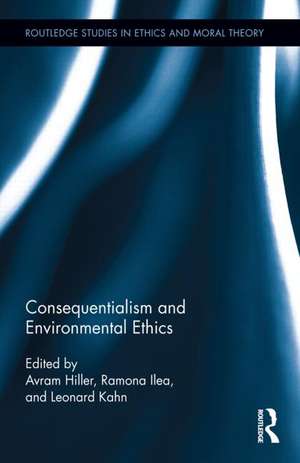Consequentialism and Environmental Ethics: Routledge Studies in Ethics and Moral Theory
Editat de Avram Hiller, Ramona Ilea, Leonard Kahnen Limba Engleză Hardback – 14 dec 2013
| Toate formatele și edițiile | Preț | Express |
|---|---|---|
| Paperback (1) | 416.22 lei 6-8 săpt. | |
| Taylor & Francis – 29 oct 2015 | 416.22 lei 6-8 săpt. | |
| Hardback (1) | 1112.55 lei 6-8 săpt. | |
| Taylor & Francis – 14 dec 2013 | 1112.55 lei 6-8 săpt. |
Din seria Routledge Studies in Ethics and Moral Theory
-
 Preț: 295.33 lei
Preț: 295.33 lei -
 Preț: 450.59 lei
Preț: 450.59 lei -
 Preț: 311.48 lei
Preț: 311.48 lei - 9%
 Preț: 1004.84 lei
Preț: 1004.84 lei -
 Preț: 311.51 lei
Preț: 311.51 lei -
 Preț: 309.50 lei
Preț: 309.50 lei -
 Preț: 311.41 lei
Preț: 311.41 lei -
 Preț: 325.74 lei
Preț: 325.74 lei -
 Preț: 311.06 lei
Preț: 311.06 lei -
 Preț: 313.72 lei
Preț: 313.72 lei -
 Preț: 716.42 lei
Preț: 716.42 lei - 18%
 Preț: 1053.16 lei
Preț: 1053.16 lei - 18%
 Preț: 1053.92 lei
Preț: 1053.92 lei - 18%
 Preț: 1106.02 lei
Preț: 1106.02 lei - 18%
 Preț: 1058.10 lei
Preț: 1058.10 lei - 18%
 Preț: 1113.60 lei
Preț: 1113.60 lei -
 Preț: 416.22 lei
Preț: 416.22 lei - 26%
 Preț: 820.32 lei
Preț: 820.32 lei - 18%
 Preț: 1119.87 lei
Preț: 1119.87 lei -
 Preț: 382.47 lei
Preț: 382.47 lei - 30%
 Preț: 846.92 lei
Preț: 846.92 lei -
 Preț: 474.68 lei
Preț: 474.68 lei -
 Preț: 439.24 lei
Preț: 439.24 lei - 18%
 Preț: 1000.27 lei
Preț: 1000.27 lei -
 Preț: 411.42 lei
Preț: 411.42 lei - 18%
 Preț: 1057.40 lei
Preț: 1057.40 lei - 18%
 Preț: 1051.55 lei
Preț: 1051.55 lei -
 Preț: 436.14 lei
Preț: 436.14 lei - 26%
 Preț: 762.57 lei
Preț: 762.57 lei -
 Preț: 461.66 lei
Preț: 461.66 lei - 30%
 Preț: 848.57 lei
Preț: 848.57 lei -
 Preț: 408.38 lei
Preț: 408.38 lei - 18%
 Preț: 1109.18 lei
Preț: 1109.18 lei - 18%
 Preț: 1105.94 lei
Preț: 1105.94 lei - 26%
 Preț: 820.40 lei
Preț: 820.40 lei - 26%
 Preț: 763.39 lei
Preț: 763.39 lei -
 Preț: 483.20 lei
Preț: 483.20 lei - 18%
 Preț: 1109.99 lei
Preț: 1109.99 lei - 31%
 Preț: 764.22 lei
Preț: 764.22 lei -
 Preț: 449.41 lei
Preț: 449.41 lei - 18%
 Preț: 1055.51 lei
Preț: 1055.51 lei - 26%
 Preț: 848.31 lei
Preț: 848.31 lei -
 Preț: 482.17 lei
Preț: 482.17 lei -
 Preț: 428.09 lei
Preț: 428.09 lei
Preț: 1112.55 lei
Preț vechi: 1356.77 lei
-18% Nou
Puncte Express: 1669
Preț estimativ în valută:
212.88€ • 222.87$ • 176.15£
212.88€ • 222.87$ • 176.15£
Carte tipărită la comandă
Livrare economică 05-19 aprilie
Preluare comenzi: 021 569.72.76
Specificații
ISBN-13: 9780415823807
ISBN-10: 0415823803
Pagini: 212
Ilustrații: 5 tables
Dimensiuni: 152 x 229 x 25 mm
Greutate: 0.55 kg
Ediția:New.
Editura: Taylor & Francis
Colecția Routledge
Seria Routledge Studies in Ethics and Moral Theory
Locul publicării:Oxford, United Kingdom
ISBN-10: 0415823803
Pagini: 212
Ilustrații: 5 tables
Dimensiuni: 152 x 229 x 25 mm
Greutate: 0.55 kg
Ediția:New.
Editura: Taylor & Francis
Colecția Routledge
Seria Routledge Studies in Ethics and Moral Theory
Locul publicării:Oxford, United Kingdom
Public țintă
Postgraduate and UndergraduateCuprins
Introduction: Consequentialism and Environmental Ethics Avram Hiller and Leonard Kahn Part I: Environmental Value and Its Structure 1. The Bearers of Value in Environmental Ethics Katie McShane 2. Can Biocentric Consequentialism Meet Pluralist Challenges? Robin Attfield 3. System Consequentialism Avram Hiller 4. Indirect, Multidimensional Consequentialism Alan Carter 5. Why Leave Nature Alone? Ben Bradley Part II: Consequentialism and Environmental Decision-making 6. On Some Limitations of Consequentialism in the Sphere of Environmental Ethics Alan Holland 7. Evaluative Uncertainty, Environmental Ethics, and Consequentialism Krister Bykvist 8. Future Generations and Resource Shares Allen Habib 9. Can We Remediate Wrongs? Benjamin Hale 10. Moral Bookkeeping, Consequentialism, and Carbon Offsets Julia Driver 11. John Stuart Mill's Green Liberalism and Ecofeminism Wendy Donner
Recenzii
"...this volume…contains several thought-provoking ideas that deserve to be seriously considered by scholars interested in environmental ethics. The level of argumentation is high, and the authors mean exactly what they write." -- Martin Peterson, Eindhoven University of Technology in Notre Dame Philosophical Reviews
"This collection has a number of strengths. Many contributors focus on ethical theory and consequentialism generally, rather than environmental ethics; thus this book reflects greater attention to broader theoretical issues than some similar anthologies do. Additionally, since much of the work in environmental ethics does not come from a consequentialist perspective, this volume provides a distinct way of thinking about and responding to various issues in that field. Given the relative scarcity of works that address these issues from a consequentialist perspective, and given the high quality of the papers throughout, this book will be a valuable acquisition for academic libraries. Summing Up: Highly recommended." -- M A. Michael, Austin Peay State University, in CHOICE
"This collection has a number of strengths. Many contributors focus on ethical theory and consequentialism generally, rather than environmental ethics; thus this book reflects greater attention to broader theoretical issues than some similar anthologies do. Additionally, since much of the work in environmental ethics does not come from a consequentialist perspective, this volume provides a distinct way of thinking about and responding to various issues in that field. Given the relative scarcity of works that address these issues from a consequentialist perspective, and given the high quality of the papers throughout, this book will be a valuable acquisition for academic libraries. Summing Up: Highly recommended." -- M A. Michael, Austin Peay State University, in CHOICE
Descriere
This volume works to connect issues in environmental ethics with the best work in contemporary normative theory. In particular, the contributors use consequentialist theory to address central questions in environmental ethics, such as questions about what kinds of things have value; about decision-making in light of the long-term, intergenerational nature of environmental issues; and about the role that a state’s being natural should play in ethical deliberation.


















